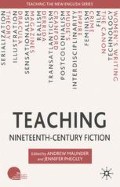Abstract
In 1921, in a book called English for the English, George Sampson, Secretary of the English Association, set down his recommendations for the teaching of literature. Sampson, a member of the committee that in the same year produced the Report for the Teaching of English in England, under the chairmanship of Sir Henry Newbolt, was a devotee of Matthew Arnold and shared the Victorian sage’s sense that literature was a powerful force for humanizing and civilizing. Sampson thus counselled that “Personal kindness” must guide the teacher and the teacher should think more of his students’ hearts than their heads. But he recognized that enthusing students about nineteenth-century literature was a problem. How to do it? They could be asked to study and imitate passages from Austen and Dickens (“models of structure and punctuation”) but could they be taught to appreciate them? Sampson’s advice was as follows:
Teachers will have their own views of how to deal with long prose works, a novel by Dickens for example. Plainly, neither teacher nor class can read the whole of David Copperfield or Pickwick in a single term. It is unfair to protract the reading of any work. The class will do much by silent reading but occasionally the teacher will read scenes or passages as a treat – if his reading is not a treat he ought not to be a teacher – and occasionally members of the class will be expected to read to the others. Any book that a class finds “dry” should not be pursued to the bitter end, however sweet the teacher may think it. … In fact, the whole idea of compulsion is alien to the world of art. This is certain, that if you make boys read The Fair Maid of Perth when they would rather be reading Ivanhoe you will make them dislike Scott altogether. To persist with an unpopular work merely because it has been begun is to make a discipline of what should be a delight, and to disallow a rational exercise of the taste we are trying to cultivate. We must be ready to try any new adventurous experiment in education; we must be just as ready to scrap our failures. (1921, p. 89)
Access this chapter
Tax calculation will be finalised at checkout
Purchases are for personal use only
Preview
Unable to display preview. Download preview PDF.
Works cited
Barry, Peter, English in Practice: In Pursuit of English Studies (London: Arnold, 2003).
Davison, Margaret (ed.), Bram Stoker’s Dracula: Sucking Through the Century, 1897–1997 (Toronto: University of Toronto Press, 1997).
Dentith, Simon, “Reader, I Triumphed: Complicating the Appeal of Jane Eyre,” English Subject Centre Newsletter 9 (November 2005), pp. 19–25.
Eaglestone, Robert, Doing English: A Guide for Literature Students (London: Routledge, 2000).
Easthope, Antony, Literary into Cultural Studies (London: Routledge, 1991), 12.
Hammond, Mary, Reading, Publishing and the Formation of Literary Taste (Aldershot: Ashgate, 2006).
Holberg, Jennifer L. and Marcy Taylor, “Editor’s Introduction.” Pedagogy: Critical Approaches to Teaching Literature, Language, Composition, and Culture, 1.1 (2001), pp. 1–5.
Hutchinson, Linda, “Beginning to Theorize Postmodernism,” Textual Practice, 1:1 (1987), pp. 10–31.
James, Henry, The Art of the Novel: Critical Prefaces (London: Charles Scribner’s, 1935).
Leavis, F. R., The Great Tradition (Harmondsworth: Penguin, 1962).
Leitch, Vincent B., American Literary Criticism from the Thirties to the Eighties (New York: Columbia University Press, 1988).
Levine, George, “The Two Nations.” Pedagogy: Critical Approaches to Teaching Literature, Language, Composition, and Culture, 1.1 (2001), pp. 7–19.
Levine, George, “Foreword.” Tanya Agathocleous and Ann C. Dean (eds.), Teaching Literature: A Companion (Palgrave Macmillan, 2003), pp. vii–xii.
Macdonald, Peter D., British Literary Culture and Publishing Practice1880–1914 (Cambridge: Cambridge University Press, 1997).
Poovey, Mary, Uneven Developments: The Ideological Work of Gender in Mid-Victorian England (Chicago: University of Chicago Press, 1988).
Rogers, Helen, “Searching Questions: Digital Research and Victorian Culture,” Journal of Victorian Culture, 13.1 (Spring 2008), pp. 56–7.
Sampson, George, English for the English. A Chapter on National Education (Cambridge: Cambridge University Press, 1921).
Sanders, Valerie, “Where Next in Victorian Literary Studies? – Historicism, Collaboration and Digital Editing,” Literature Compass, 4 (2007), pp. 1292–302.
Showalter, Elaine, Teaching Literature (Oxford: Blackwell Publishing, 2003).
Trollope, Anthony, Four Lectures. Ed. Morris L. Parrish (London: Constable & Co., 1938).
Waller, Philip, Writers, Readers and Reputations: Literary Life in Britain1870–1918 (Oxford: Oxford University Press, 2006).
Wells, H. G., The Country of the Blind (London: Thomas Nelson and Sons, 1913).
Widdowson, Peter (ed.), Re-reading English (London: Methuen, 1982).
Williams, Carolyn, “Genre Matters: Response,” Victorian Studies, 48:2 (2006), pp. 295–304.
Williams, Raymond, “When was Modernism?,” in The Politics of Modernism, ed. Tony Pinkney (London: Verso, 1989), pp. 31–5.
Wiltshire, John, Recreating Jane Austen (Cambridge: Cambridge University Press, 2001).
Editor information
Editors and Affiliations
Copyright information
© 2010 Andrew Maunder and Jennifer Phegley
About this chapter
Cite this chapter
Maunder, A., Phegley, J. (2010). Introduction. In: Maunder, A., Phegley, J. (eds) Teaching Nineteenth-Century Fiction. Teaching the New English. Palgrave Macmillan, London. https://doi.org/10.1057/9780230281264_1
Download citation
DOI: https://doi.org/10.1057/9780230281264_1
Publisher Name: Palgrave Macmillan, London
Print ISBN: 978-0-230-53781-1
Online ISBN: 978-0-230-28126-4
eBook Packages: Palgrave Literature CollectionLiterature, Cultural and Media Studies (R0)

